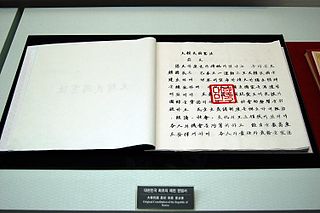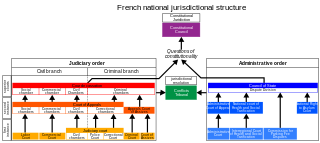
Constitutional law is a body of law which defines the role, powers, and structure of different entities within a state, namely, the executive, the parliament or legislature, and the judiciary; as well as the basic rights of citizens and, in federal countries such as the United States and Canada, the relationship between the central government and state, provincial, or territorial governments.

The Constitution of Canada is the supreme law in Canada. It outlines Canada's system of government and the civil and human rights of those who are citizens of Canada and non-citizens in Canada. Its contents are an amalgamation of various codified acts, treaties between the Crown and Indigenous Peoples, uncodified traditions and conventions. Canada is one of the oldest constitutional monarchies in the world.
Judicial independence is the concept that the judiciary should be independent from the other branches of government. That is, courts should not be subject to improper influence from the other branches of government or from private or partisan interests. Judicial independence is important for the idea of separation of powers.

The Canadian Charter of Rights and Freedoms, often simply referred to as the Charter in Canada, is a bill of rights entrenched in the Constitution of Canada, forming the first part of the Constitution Act, 1982. The Charter guarantees certain political rights to Canadian citizens and civil rights of everyone in Canada from the policies and actions of all governments in Canada. It is designed to unify Canadians around a set of principles that embody those rights. The Charter was proclaimed in force by Queen Elizabeth II of Canada on April 17, 1982, as part of the Constitution Act, 1982.
In Canadian and New Zealand law, fundamental justice is the fairness underlying the administration of justice and its operation. The principles of fundamental justice are specific legal principles that command "significant societal consensus" as "fundamental to the way in which the legal system ought fairly to operate", per R v Malmo-Levine. These principles may stipulate basic procedural rights afforded to anyone facing an adjudicative process or procedure that affects fundamental rights and freedoms, and certain substantive standards related to the rule of law that regulate the actions of the state.
The implied bill of rights is a theory in Canadian jurisprudence which proposed that as a consequence of the British North America Act, certain important civil liberties could not be abrogated by the government. The theory was never adopted in a majority decision of the Supreme Court of Canada, and was rejected by the court in 1978. The enactment and interpretation of the statutory Bill of Rights, and later the constitutional Charter of Rights and Freedoms, provided alternative formulations of the limits applicable to civil liberties.

The current Constitution of France was adopted on 4 October 1958. It is typically called the Constitution of the Fifth Republic(French: la Constitution de la Cinquième République), and it replaced the Constitution of the Fourth Republic of 1946 with the exception of the preamble per a 1971 decision of the Constitutional Council. The current Constitution regards the separation of church and state, democracy, social welfare, and indivisibility as core principles of the French state.

The Constitution of the Czech Republic is the supreme law of the Czech Republic. The current constitution was adopted by the Czech National Council on 16 December 1992. It entered into force on 1 January 1993, replacing the 1960 Constitution of Czechoslovakia and the constitutional act No. 143/1968 Col., when Czechoslovakia gave way to the Slovak Republic and the Czech Republic in a peaceful dissolution.

The Preamble to the United States Constitution, beginning with the words We the People, is a brief introductory statement of the US Constitution's fundamental purposes and guiding principles. Courts have referred to it as reliable evidence of the Founding Fathers' intentions regarding the Constitution's meaning and what they hoped the Constitution would achieve.

The Constitutional Council is the highest constitutional authority in France. It was established by the Constitution of the Fifth Republic on 4 October 1958 to ensure that constitutional principles and rules are upheld. It is housed in the Palais-Royal in Paris. Its main activity is to rule on whether proposed statutes conform with the Constitution, after they have been voted by Parliament and before they are signed into law by the President of the Republic, or passed by the government as a decree, which has law status in many domains, a right granted to the government under delegation of Parliament.

The Constitution of the Republic of Korea is the supreme law of South Korea. It was promulgated on July 17, 1948, and last revised on October 29, 1987.

French law has a dual jurisdictional system comprising private law, also known as judicial law, and public law.

The Reference re Remuneration of Judges of the Provincial Court (P.E.I.) [1997] 3 S.C.R. 3 is a leading opinion of the Supreme Court of Canada in response to a reference question regarding remuneration and the independence and impartiality of provincial court judges. Notably, the majority opinion found all judges are independent, not just superior court judges and inferior court judges concerned with criminal law, as the written constitution stipulates. Unwritten constitutional principles were relied upon to demonstrate this, indicating such principles were growing in importance in constitutional interpretation. The reference also remains one of the most definitive statements on the extent to which all judges in Canada are protected by the Constitution.
The preamble to the Canadian Charter of Rights and Freedoms is the introductory sentence to the Constitution of Canada's Charter of Rights and Constitution Act, 1982. In full, it reads, "Whereas Canada is founded upon principles that recognize the supremacy of God and the rule of law".

Judicial review is a process under which a government's executive, legislative, or administrative actions are subject to review by the judiciary. In a judicial review, a court may invalidate laws, acts, or governmental actions that are incompatible with a higher authority. For example, an executive decision may be invalidated for being unlawful, or a statute may be invalidated for violating the terms of a constitution. Judicial review is one of the checks and balances in the separation of powers—the power of the judiciary to supervise the legislative and executive branches when the latter exceed their authority. The doctrine varies between jurisdictions, so the procedure and scope of judicial review may differ between and within countries.

The politics of France take place with the framework of a semi-presidential system determined by the French Constitution of the French Fifth Republic. The nation declares itself to be an "indivisible, secular, democratic, and social Republic". The constitution provides for a separation of powers and proclaims France's "attachment to the Rights of Man and the principles of National Sovereignty as defined by the Declaration of 1789".

The Preamble to the Constitution Act, 1867 is a provision of the Constitution of Canada, setting out some of the general goals and principles of the Act. Although the Preamble is not a substantive provision, the courts have used it as a guide to the interpretation of the Constitution of Canada, particularly unwritten constitutional principles which inform the history and meaning of the Constitution.
In France, the fundamental principles recognized by the laws of the Republic are certain principles recognized by the Constitutional Council and the Council of State as having constitutional force.













